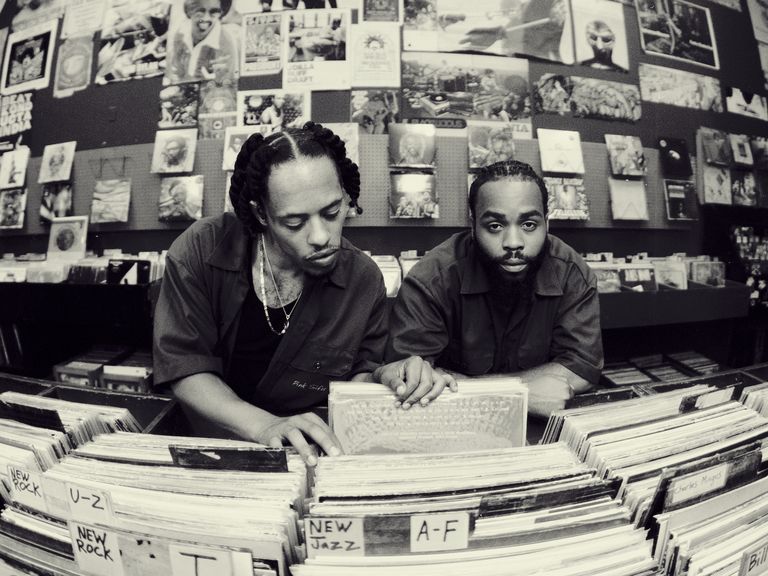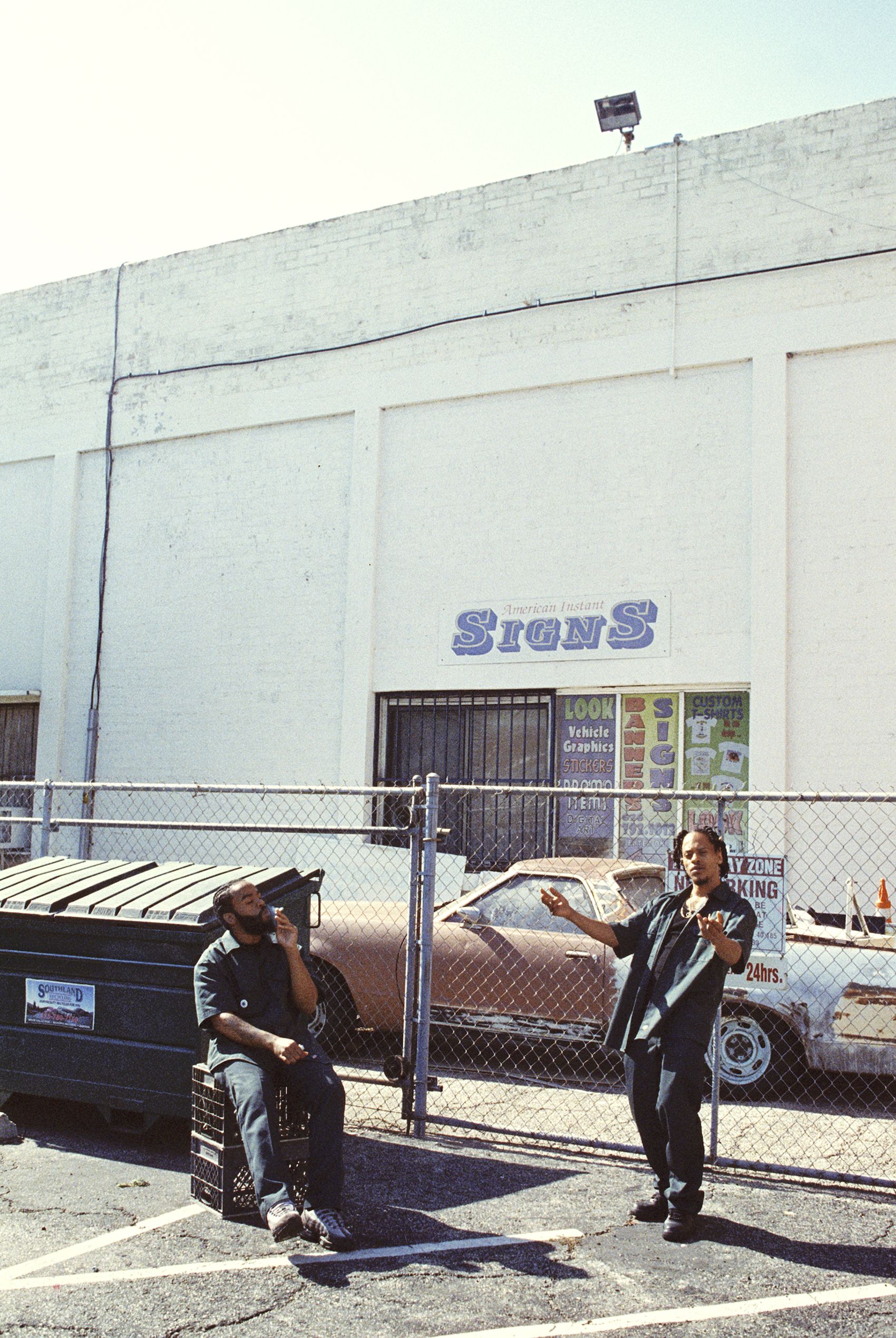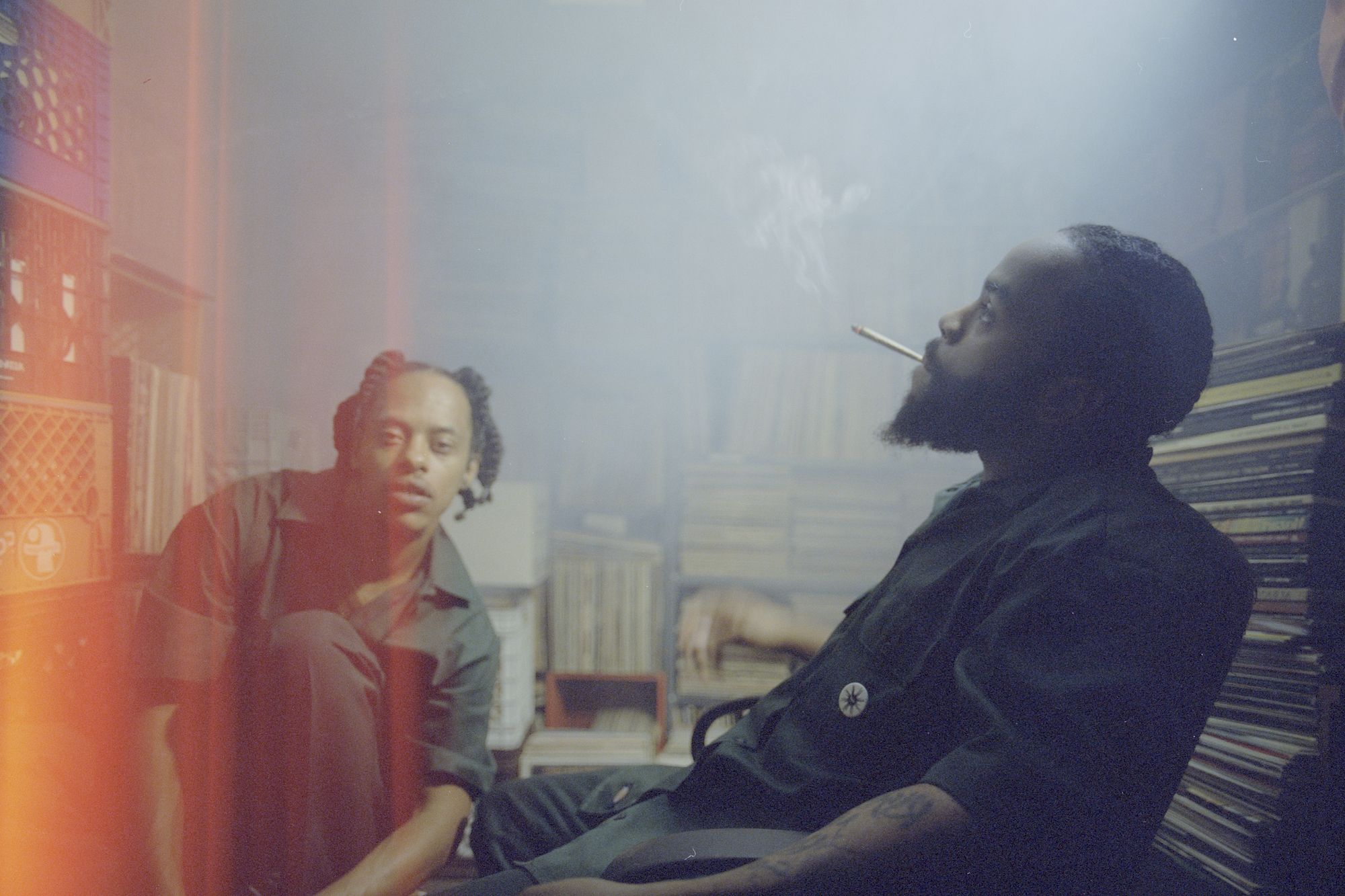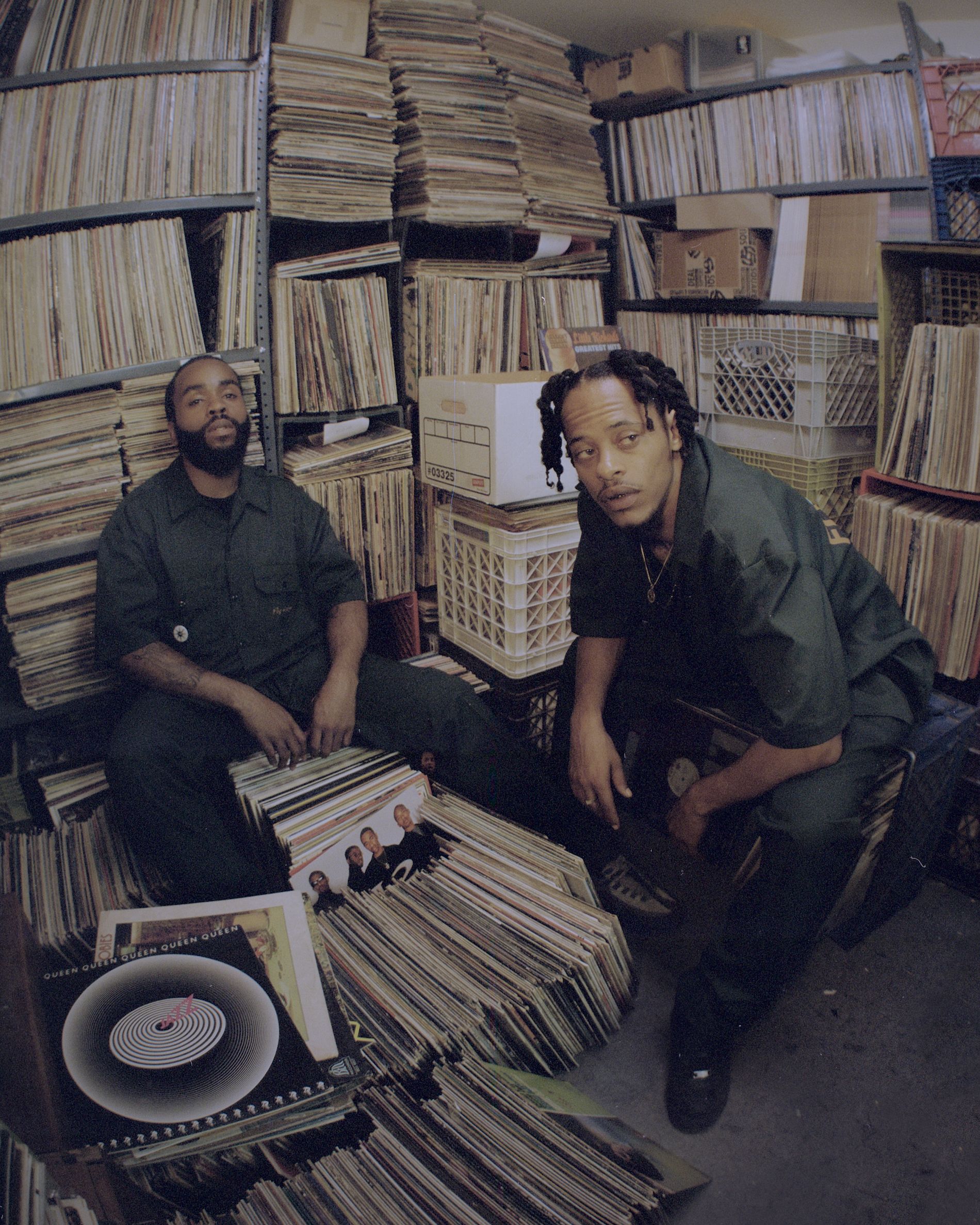Wu-Tang Clan’s ‘People Say’ drowns out any chance of holding a conversation at The Helm Tattoo & Piercing Shop in Oglethorpe, Georgia, where Frank Walton is waiting patiently for a friend to get inked. Declared “one of the illest MCs” by legendary beat-maker Madlib, the Richmond, Virginia native is known to rap connoisseurs as Fly Anakin – a founding member of the revered Mutant Academy collective.
He steps outside, underdressed for the spring morning, as his friend and collaborator Livingston Matthews, known as Pink Siifu, flashes up on screen beside him. Over the past decade, the charismatic Birmingham, Alabama-born musician has built an incredibly deep, genre-agnostic catalogue. There are more than 50 albums, mixtapes and EPs available on his Bandcamp page, with notable releases including 2018’s soulful rap collage ensley and last year’s punk and jazz infused NEGRO.
“Fuck is up? I’m in Cincinnati,” Siifu announces enthusiastically.
“It’s cold as a bitch out here,” complains Anakin. “I got on shorts and shit. Let’s just get it done!”
The duo are used to meeting this way now, having released two collaborative records during the pandemic. FlySiifu’s dropped via Camden-based indie label Lex Records – which celebrates its 20th anniversary this year – last November, and $mokebreak, which can be consumed as a stand-alone 10-track EP or a deluxe edition of the album, followed in March.
Both take place in an imaginary record store named FlySiifu’s, where the pair play employees who mostly seem to get stoned in the back room. Their peers call in between tracks to enquire about records that range from J Dilla’s Welcome 2 Detroit to Nelly’s Sweat. On FlySiifu’s, the record store becomes a multi-verse. Those who call in do so from their own worlds – ones that listeners can delve into via a network of Bandcamp pages and streaming services – making contact as a reminder that there is life out there, even in the midst of a global pandemic.
“All them calls [on the skits] is different callers: you don’t know what happens when them n****s pulled up to the shop. It’s like Star Wars in a sense,” says Anakin. “All of these characters and shit, you don’t know what the hell they doing when they not on the screen. We created doors with that shit, portals and shit.”
While FlySiifu’s doesn’t currently exist on our astral plane, Poo-Bah Record Shop in Pasadena, California serves as its physical incarnation, appearing in music videos and artwork, and contributing to its lived-in feel. The store holds particular importance to Siifu and Anakin, due to the late Ras G, the pioneering “ghetto sci-fi” beat-maker who passed away in 2019 and had been an employee of the store.
“That was like his record shop in a sense. And he used to do hella performances there,” says Siifu. “My first show in LA I got booed at. Then my second show was at Poo-Bah and that shit feel like home.”
Seeing the store appear in Eddie Murphy’s Dolemite Is My Name appealed to the film buff in Siifu, who drew inspiration for the concept from Pinky’s Record Store in Ice Cube’s 2000 stoner comedy Next Friday: “I love films and I was like, ‘We gotta rep some shit that we actually fuck with.’ And why not Poo-Bah? Why not the Ras G mural?”
More than just a retro filter through which their vision is presented, record shops are intrinsic to a lifestyle that connects their collaborators.
“Their importance couldn’t be understated,” says London-born producer and DJ, Budgie. His own musical education came from his father’s shop – Portobello Road staple Honest Jon’s Records – and he moved to LA in 2014 to pursue music. Since then he's released two gospel-sampling albums with Alchemist, worked with Action Bronson and Kanye West, and produced ‘Suitcase Special’ and ‘3 Dope Boys’ for Siifu and Anakin.
“Record stores are super important because that’s where we get the source material,” says New York rapper and producer Chuck Strangers. He had just picked up a new stack of records when Siifu and Anakin passed through his friend’s apartment in New York and heard him playing with the beat that would become ‘Oatmeal’.
It’s difficult to pinpoint the album’s exact origin, but one point of convergence in its oral history is Black Be Tha God, a show in Brooklyn that took place a year before the world shut down. Siifu was offered a show at the club and arts space Elsewhere, and took the opportunity to elevate those around him, inviting Fly Anakin and Los Angeles rapper Maxo for a triple-headliner.
“There was this crazy vibe, everyone was just on top form,” remembers Lex Records A&R Dan Horitz. “The same night Earl Sweatshirt had a big show at Madison Square Garden, so he came through with his crew afterwards, and it just felt like the whole scene congregated that night.”
“That show was amazing,” concurs Charlotte, North Carolina rapper Mavi, who also performed. “That was a real turning point just for me feeling energised, excited, just feeling purposeful in my art work. At the heart of FlySiifu’s is community.”
The bulk of the original record was recorded during a week in Los Angeles in early 2020, with most of its extensive list of collaborators passing through the sessions. $mokebreak pushes the community element even further – Siifu calls it “the super friends album”. Over both releases there are 17 producers and 12 features credited, and that’s aside from the callers on the skits. Unlike a lot of historical movements in rap music, participants aren’t united by location, which has added to the uniqueness of the music that’s being made.
“It turn into a gumbo pot man,” says Anakin. “You’ve got different slang, different outlooks of life. It’s a chance to merge and blend things. Blend struggles and shit. We can create some brand new shit just by being Black in the same room.”
“Exactly!” Agrees Siifu. “It ain’t nothing like being with only country n****s, or only East Coast n****s or only West Coast n****s, but when they’re all together and when they all click, that shit’s beautiful. That shit’s magic.”
“It just sounds like something you never heard before!”
It’s difficult to define such a vast and creative group of artists in a way that is both thoughtful and specific. It isn’t enough to talk about a style of music, but more a common ethos: a fresh examination of hip-hop’s traditions from artists who aren’t afraid to be hands-on with their source material, pulling and stretching it into every direction until new worlds are formed.
“It’s this tapestry, we all have this common thread,” says Richmond producer Ohbliv, who made a decision early in his career to help build the scene in his hometown. Despite growing up in the same area as Fly Anakin, he found out about him through Twitter, and the pair formed a creative relationship, later joining forces for the 2018 cult classic Backyard Boogie. “We’re all coming from different places and different experiences, but through the music that’s how we speak and we connect through that level. We all are creating this community, almost like a nation, digitally. Because what is a nation? We’re connected by common themes, common music, art and stuff like that.”
“It’s a group of artists that really want Black people to be free,” says Mavi, who appears on ‘Tha Divide’ - a posse cut that also features ZelooperZ and Koncept Jack$on and was recorded at Alchemist’s house in LA. “Especially in the entertainment industry as it exists in America – you get rewarded for strange things sometimes. And our community just re-centres the point of all this shit, in helping and being good to our people.”
Dallas native Liv.e was inspired to contribute her meditative verse to stand-out track ‘Mind Right’ when the melancholy haze of Jay Versace’s instrumental spoke to her. She believes that while the power in numbers has helped the momentum of each creator, her sense of community really comes down to friendship.
“We all just fuck with each other,” she says with a grin. “I think you can tell when people just solely base their friendships and partnerships off music only.”
FlySiifu’s draws from a lineage of what might be considered underground hip-hop, but that term feels increasingly redundant: as access to music becomes more democratic, the gap between underground and mainstream narrows. Looking at last year’s Grammy nominees, particularly the Best Rap Album category, mainstream recognition isn’t sonically distant for the FlySiifu’s universe.
“N****s been really paying attention and just saluting us, n****s that’s Grammy nominees and shit,” says Siifu. “I just feel like we just used all our resources and this is like our superpower album. We had the perfect concept while n****s was watching.”
“Most of this shit always be in reach,” offers Anakin. “I lowkey expected people to like [the album] but I ain’t think people would go crazy like they did for it.”
“I feel like a Grammy is hella in reach for mad n****s man,” agrees Siifu. “That’s just how I feel though. And it is just a Grammy, but with Alchemist and Freddie [Gibbs] being nominated and shit, and Tyler [The Creator] - all of these cats. I feel like it’s changing. I definitely fuck with that shit.”
“I’m glad Nas got his first one,” says Anakin.
“Yeah, that’s insane!”
“I think people are gravitating towards what’s real, and the best music is gonna rise to the top,” says New Jersey singer-songwriter Fousheé. A former housemate of Siifu’s, she recently had success on TikTok when an uncredited sample of her song ‘Deep End’ went viral via the Brooklyn drill rapper Sleepy Hallow’s ‘Deep End Freestyle’, and her anonymous vocal became a hit. After a fight for her deserved recognition, she signed a deal with RCA records and recently released the Lil Wayne-assisted single ‘gold fronts’. “As long as it’s in the hands of the listener I think the gap is going to close. But I don’t ever see these artists compromising their values to try to be in front of a whole bunch of people.”
“My favourite n****s is Prince, James Brown, Dungeon Family. So I don’t even give a fuck about that shit, because I’m trying to make music,” confirms Siifu. “I feel like the legends didn’t give a fuck about that shit. It was more about that feeling. It’s all just n****s being creative. I like surprising n****s. I feel like it’s a slap to call anybody anything. I don’t fuck with boxes at all.”
By putting artistic integrity at the forefront – not only of their creative process, but also their career ambitions – artists like Pink Siifu and Fly Anakin aren’t at the mercy of the music industry. In the midst of a global pandemic, they’ve managed not just to survive, but to elevate themselves. FlySiifu’s simultaneously feels like a mission statement, a celebration of community, a music discovery platform, and a place of refuge.
“We created our own world that people can go to, and feel like shit ain’t as bad as it is,” says Fly Anakin, as a car pulls up to the tattoo shop to save him from the cold. “There was one dude I saw, he tweeted the day $mokebreak came out, saying he was walking in the rain listening to FlySiifu’s. If you can walk in the rain to that shit, it’s probably putting your soul at peace. You gotta feel some kind of bliss to be able to just deal with being soaking wet."
“It’s like take you out of what’s going on, come to the record shop type shit,” replies Siifu. “We definitely made something that can take n****s elsewhere.”
Like this article? Sign up to our newsletter to get more articles like this delivered straight to your inbox
Need some positivity right now? Subscribe to Esquire now for a hit of style, fitness, culture and advice from the experts
















